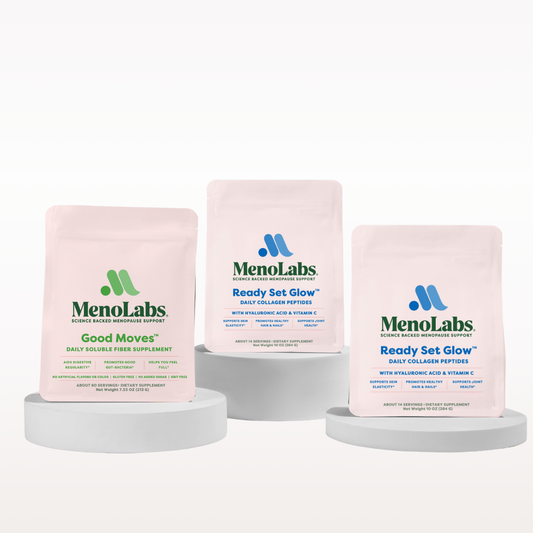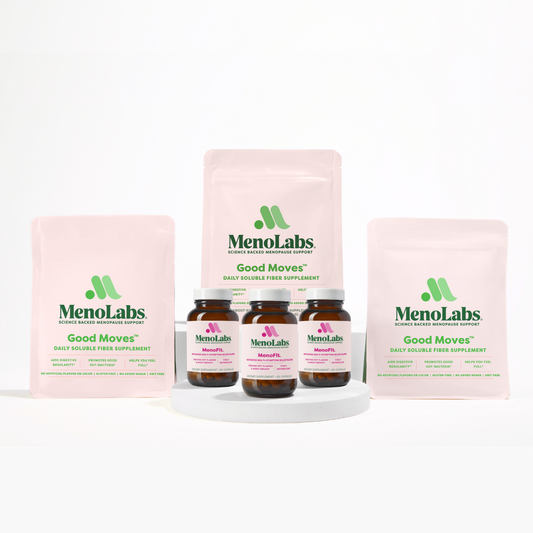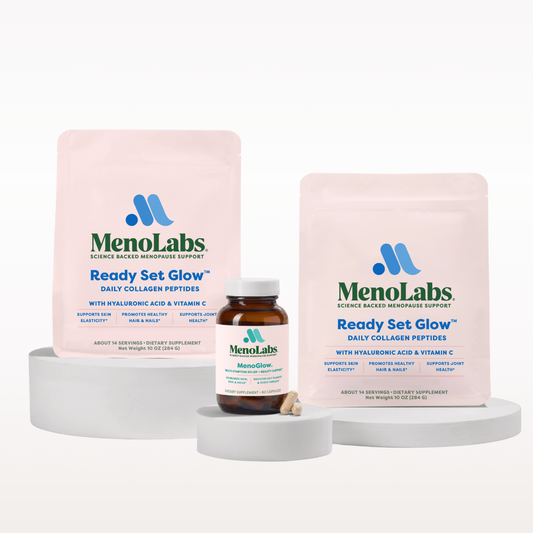
- Mood
- Relationships
- Self Care
How to Help Your Younger Partner Understand Your Menopause Journey
As you go through your menopausal transitions, it can be difficult for you to talk about your issues with your partner(s), particularly when sex is involved.
1 min read
Very few people understand what women go through as they experience menopause. As you go through your menopausal transitions, it can be difficult for you to talk about your issues with your partner(s), particularly when sex is involved. As women go through menopause, their sex lives are significantly altered.
How are Estrogen and Progesterone Levels affected in Menopause?
The hormones responsible for regulating the reproductive system are estrogen and progesterone. During menstruation, the body naturally releases both of these hormones to help regulate sexual activity and prepare the body for conception. Menopause decreases the quantities of estrogen and progesterone in the body, which can result in a number of sex-related issues.
1) Decreased libido
Estrogen is the hormone responsible for sexual arousal. While menstruation tends to increase estrogen throughout the body, as it prepares for conception, the opposite reaction happens during menopause. Estrogen decreases during menopause, making it more difficult for women to experience sexual arousal. Because of this, women often feel that they are unable to perform in their sex lives and withdraw from engaging in sexual activities out of fear of disappointing their partners.
If you find yourself experiencing difficulty getting aroused, do not be ashamed of telling your partner. Sit them down and discuss it honestly. Explain the changes that you are experiencing so that your partner can fully understand what they can do to support you.
2) Vaginal dryness
Estrogen affects more than just how we feel in the lead up to sexual activities. It also affects how sex organs perform. Sexual arousal occurs when estrogen increases blood flow to the vagina. This increase of blood circulation causes the cervix and the glands at the entrance of the vagina to secrete a fluid that acts as a lubricant, preparing the vaginal canal for penetration.
However, when estrogen decreases, it becomes more difficult for blood to flow to the vagina, making it more difficult for the vagina to become naturally lubricated. This is how vaginal dryness occurs.
3) Pain during penetrative sex
As estrogen decreases and causes vaginal dryness to occur, penetrative sex can become extremely uncomfortable. When the cervix and vaginal glands can no longer produce fluid, the vaginal walls become dry. As a result, the friction of penetration rubs against the vaginal canal and agitates it. This is where many women cite pain during penetrative sex, and it often results in prematurely ending sexual activity between a woman and her partner(s).
Given this information, how can couples resume sexual activity without causing additional discomfort?
1) Use water-based lubricants
This is a fairly common solution to combating vaginal dryness, even among women who are not experiencing menopause. When natural lubricants cannot be produced by the vagina, using an artificial one can help reduce irritation during sex.

Water-based lubricants are one of the safest options since they don't cause condoms to degrade. (Note: condoms can still be used during menopause to prevent sexually transmitted infections, they are not just to prevent pregnancy). It's preferable during menopause to use glycerin-free lubricants, especially if the body is prone to contracting yeast infections. In some cases, menopause can exacerbate yeast infections for a small percentage of women. Combatting vaginal dryness before sex can easily be achieved by using lubricants, and it can become part of foreplay for your respective partner(s).
2) Change sexual routines
Difficulty experiencing sexual arousal may feel like a burden, but it can be an opportunity to begin exploring new sexual avenues. Introducing role play, sensory play, and different sexual positions can help increase arousal in a shared experience. It can revamp confidence for both you and your partner during sexual intercourse. Find what works for you and be willing to experiment with things that may not be part of the normal routine. Innovation can be a useful aid in the bedroom.
3) Communicate honestly
When experiencing pain, discomfort, or embarrassment during sex, it's important for you to talk about those issues with your partner openly. Find ways to communicate with your partner about what is working and what isn't. Putting on a brave face when experiencing pain during sex does not help your personal health. Be honest, be forthcoming, and make it clear that your partner is listening to your needs so that the two of you can participate in enjoyable sex.
4) Prolong foreplay
As estrogen naturally decreases during menopause, it can take longer to feel aroused. Taking the time to achieve sexual arousal is crucial to helping you feel more comfortable when engaging in sexual activity. Foreplay can be an asset in helping you achieve heightened sexual arousal.
Determining what you enjoy during sex or what you and your partner are willing to try before engaging in strictly penetrative sex, can help you both feel more comfortable about your respective sexual performances.
Be experimental, be provocative, and above all, be compassionate. Listen to your partner's needs. Be sympathetic to their discomforts and find ways to work around them.
5) Get help balancing hormones
If, for any reason, you are experiencing menopause and you have tried all of the above methods to deal with uncomfortable sex but you are still experiencing problems, there are medical solutions that might provide you with some relief.
Sometimes women who undergo menopause experience something called vaginal atrophy. Vaginal atrophy is a medical condition in which decreased estrogen levels cause the linings of the vaginal wall to thin. This can make sex even more painful than it already is for women going through menopause.
If you're experiencing vaginal atrophy, talk to your doctor about hormone replacement therapy. Medications can help regulate your hormones as you go through menopause, they can't stop or reverse menopause but they can help regulate hormone levels. With the help of HRT, estrogen levels rise and help the natural lubrication process, making the tissues of the vaginal wall moist.

Again, only seek out hormone replacement therapy if you have exhausted all other options and your symptoms worsen during and after sexual activity.
Sex during menopause can be challenging but it is not impossible. It is incumbent upon you to talk to your partner and learn how to combat these discomforts together. If you want to gain a better understanding of what can affect your sex life during menopause, look at the research studies below and educate both yourself and your partner to implement the best solutions for your sex life.
1) Factors affecting sexual function in menopause: A review article
2) Does Type of Menopause Affect the Sex Lives of Women?Related Products
Blend Besties Bundle
Fresh Start Bundle
4.7 / 5.0
(553) 553 total reviews











